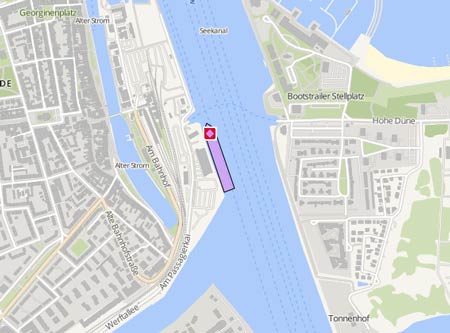WSF WENATCHEE
Course/Position
Latest ports
Latest Waypoints
Latest news
Ferry sidelined due to mechanical problems
The 'Wenatchee', serving on the route between Seattle and Bainbridge Island, had to bely taken out of service due to mechanical issues, experiencing problems with two of its four drive motors on Aug 15, 2025, shortly after 10 a.m., while docking at Seattle’s Colman Dock. The ferry had recently rejoined the fleet in July after a 22-month conversion to a hybrid-electric system at Vigor Marine's Seattle shipyard. The issue was not tied to the vessel’s hybrid-electric power system, but was related to having a ship out for 22 months and then commissioning and getting back in service. The vessel was moved to Eagle Harbor on Bainbridge Island for further inspections. The problem may be linked to control system communication wires, which may have caused intermittent instability. Technicians of WSF were looking at those wires and how that signaling happens, in order to repair it and get the vessel back in operation. The service on the route continued uninterrupted, with the ferries 'Walla Walla' and 'Tacoma' filling in.
Report: Faulty fastener caused fire
On April 22, 2021, an engine failure on the 'Wenatchee' near Bainbridge Island, Washington, started a fire that caused more than $3.8 million in damage. The National Transportation Safety Board has concluded its investigation into the incident and tied the fire aboard the Wenatchee to an improperly tightened fastener. The fire occurred during a sea trial in the Puget Sound after the fastener failure led to components from the engine being ejected and causing a fire in the engine room. Luckily, none of the 13 crew members were injured, and their swift action prevented it from being worse. The issue dates back to Nov. 2020, when the 'Wenatchee' was taken out of service for maintenance. During maintenance, two of the four main diesel engines were overhauled by factory-trained technicians. In Feb 2021, a crew conducted engine tests following the overhauls. Alarms went off in the No. 3 main engine, and crew members found pieces of a cigarette lighter in the lube oil system. The maintenance technicians returned, drained the oil and searched the lube oil system for two days. They recovered about 70% of the cigarette lighter's plastic and metal components and told Washington State Ferries that it was fine to run the engine. However, none of the engines were run again until the vessel headed for a sea trial. In April, during the post-maintenance sea trial, the connecting rod assembly in the No. 3 main engine failed and ejected components that breached the crankcase and ignited hot pressurized gasses. The crew contained the fire by stopping all fuel supply and ventilation to the engine room and isolating the space. Engineers examined the lube oil system to see if the cigarette lighter could have caused the engine failure. Although they found parts of the lighter throughout the system, they found nothing that would suggest the lighter parts started the fire. The NTSB found that the probable cause of the mechanical failure was the connecting rod assembly that came loose due to insufficient tightening (torquing) of a lower basket bolt during the previous engine overhaul. The NTSB stressed that maintenance technicians should use a calibrated torque wrench in compliance with the manufacturer's recommendations and verify that all required torque requirements had been completed.
NTSB report: Loose bolt triggered engine fire
The engine fire aboard the 'Wenatchee' on April 22, 2021, was caused by an insufficiently torqued bolt, which set off a chain reaction of broken parts and overheating, said a National Transportation Safety Board report released on March 15, 2022. There were no injuries during the accident which happened on a test sailing after a series of repairs. However, the fire caused $3.8 million in damage and kept the 'Wenatchee' out of service for nine months, which aggravated crew shortages, a lack of ships and canceled trips across Puget Sound. The NTSB summary report stated that an oiler discovered white smoke in an engine room while the ferry was heading toward Eagle Harbor at full power. Another crew member near the control panels saw fire, smoke and debris flying everywhere. The captain observed black smoke billowing from the stack. Engineers found a large rod and piston strewn on the steel engine-room floor. Forensic investigations found two broken bolts and another that unfastened while the engine was running. They were supposed to be torqued to 75 foot-pounds. By magnifying the grooves, engineers confirmed the “backed off” or unfastened nut hadn’t been tightened enough, which led to other parts misaligning, then a loss of lubricating oil. Hot gases spewed into the engine room and exploded. The crew rapidly shut all doors, fans and valves in the area to starve the area of fuel and oxygen, while five crew donned firefighting gear. But they didn’t need to apply water or carbon dioxide. The technicians worked for a Seattle-based marine contractor. A claim has been filed with the state’s insurer to pay for the damage, Sterling said. The 'Wenatchee returned' to service on the Bainbridge Island-Seattle routein late January. Full report: https://www.ntsb.gov/investigations/AccidentReports/Reports/MIR2206.pdf
Upload News

